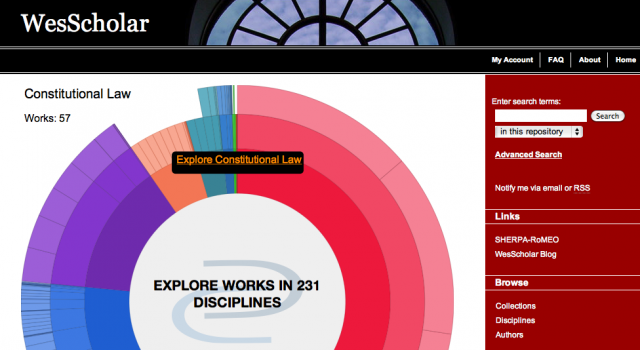WesScholar Reaches 1M Downloads

Thanks a million, WesScholar!
The open-access repository of scholarly work at Wesleyan had its one millionth download sometime in the wee hours between Oct. 1 and 2, and the number of downloads now stands at 1,000,082, according to WesScholar’s keepers at Olin Library and ITS. The title or nature of the millionth download, however, remains obscure.
“We’ve been wondering about that ourselves,” said University Archivist Leith Johnson.
Perhaps it was one of the all-time top-10 downloads of faculty work, say, “A Sorcerer’s Bottle: The Visual Art of Magic in Haiti,” by Professor of Religion Elizabeth McAlister, or one of the most frequently downloaded student papers, “Deviance in Disney: Representations of Crime in Disney Films, A Qualitative Analysis,” by Rebecca Celia Rabison ’08.
WesScholar, launched in 2008, stores student theses and papers, faculty research and journal articles, and all manner of creative work on a platform run by Berkeley Electronic Press. It provides Google-able access to this material to anyone with an Internet connection. Useful to scholars worldwide, it proves especially valuable to Wesleyan students who use it to check thesis titles and previous generations’ work as they prepare their capstone projects, or to search out alumni in their field as they start to think about jobs and graduate school. Students have the option to post completed honors theses on WesScholar; the vast majority do.
It’s also useful to faculty who can use it as a “back end “ for research projects or archival materials that aren’t published elsewhere.
“It provides a way to put all of this scholarship in a discoverable place,” Johnson said.
More than 40 professors, including President Michael Roth, use WesScholar to host their “scholar pages,” which can include bios, descriptions of current work or journal articles. Professor of Music Mark Slobin has deposited audio recordings as part of his “American Cantorate” project, for example.
Not all faculty work is deposited in WesScholar, since some publishers and journals have more open-access restrictions or a more complicated permissions process. Olin folks hope that will change.
“I would hope the next big thing for WesScholar is some sort of movement by the faculty to use it even more,” said Dan Schnaidt, manager of academic computing.
WesScholar could also provide a convenient repository for data from grant-funded research now required by the federal government, Johnson said. Any National Science Foundation grant, for example, requires that the resulting research be publicly accessible.
Of the million-plus downloads, more than 400,00 have taken place in the past year alone. Johnson is not sure why that is, although he speculates that linkage with search engines like GoogleScholar, for example, “make the work more findable.”
Some fun facts about WesScholar:
- The English Department has an updated descriptive list of books published by department members, with links to amazon.com
- Events and workshops can be “hosted” on the platform, with all collateral materials posted there for easy access by participants.
- You can browse Wesleyan University Press collections, including the “audio companions” (which used to be included as a CD in a book).
Visit the WesScholar website here.

